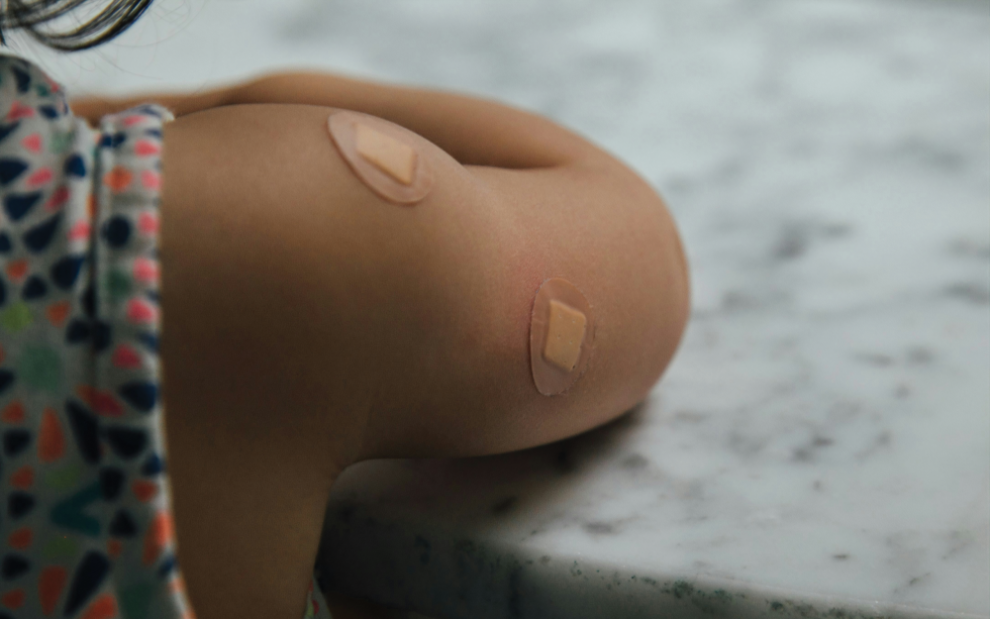For our Sounding Board column, U.S. Catholic asks authors to argue one side of a many-sided issue of importance to Catholics around the country. We also invite readers to submit their responses to these opinion essays—whether agreement or disagreement—in the survey that follows. A selection of the survey results appear below, as well as in the August 2025 issue of U.S. Catholic. You can participate in our current survey here.
The responses to this month’s survey on vaccines and the common good reflect deep convictions, genuine confusion, and, in some cases, harmful misinformation.
We struggled over how to publish the results of this survey—or whether to publish them at all. We debated whether sharing them might give oxygen to misinformation and false narratives about vaccine efficacy and Catholic teaching about vaccines. But, ultimately, we decided that this is an important snapshot of the current conversation and that the truth is not served by ignoring or burying the results.
Thus, we publish these findings not to endorse all the perspectives present, but to open up a deeper conversation about how Catholic social teaching can guide us through complex moral landscapes.
—Emily Sanna, Managing Editor
There’s nothing quite like holding down a screaming toddler while a nurse jabs their little leg with a vaccination needle. It can feel like an act of betrayal: This child who looks to you for love and protection is scared and in pain because of something you made happen. To make things worse, some very vocal groups are telling parents that vaccines themselves will harm children—that they are part of a government conspiracy, or that they cause autism. Amid such confusion and disinformation, parents may hesitate to vaccinate.
Meanwhile, the World Health Organization reports that we now have vaccines to prevent more than 20 life-threatening diseases, helping people of all ages to live longer, healthier lives. Every year, vaccines prevent 3.5 million to 5 million deaths from diseases like diphtheria, tetanus, pertussis, influenza, and measles.
These statistics indicate that having your children vaccinated, unpleasant though it may be, is good for them. It is also good for other children and immunocompromised adults. As a parent and a moral theologian, I’ve thought a lot about the issues involved and chosen to take Catholic social teaching as a guide.
The common good and herd immunity
The survey says . . .
Do you believe getting vaccinated is a moral obligation for Catholics?
- 19% – Yes, in all cases
- 1% – Only in specific situations (e.g., a pandemic)
- 80% – No, it is a personal choice
I have ethical concerns about vaccine requirements.
- 81% – Agree
- 19% – Disagree
I believe that failing to vaccinate may harm others in my community.
- 20% – Agree
- 80% – Disagree
An important principle that guides discernment on vaccination is that of the common good. Catholic teachings on this are rooted in the belief that we are social creatures who depend on each other to thrive. The Compendium of the Social Doctrine of the Church describes the common good as the “social and community dimension of the moral good.” Gaudium et Spes (On the Church in the Modern World) speaks of it as “the sum of those conditions of social life which allow social groups and their individual members relatively thorough and ready access to their own fulfillment.”
A common-good approach to the prevention of disease is grounded in a vision of a loving God who desires human flourishing—not as a solitary endeavor but as the fruit of ethical social relationships. My actions can positively or negatively impact people I will never meet, but who nonetheless share this fragile planet with me. When it comes to parenting, I do not parent in a bubble but in a broader community. This means my decision to vaccinate must consider the many relationships in which my family is embedded, as well as the safety of the people my children interact with each day.
This doesn’t apply only to one-to-one interactions. Vaccination contributes to what public health researchers describe as “herd immunity”—that is, the protection offered to everyone in a community. When an individual who is eligible to be vaccinated refuses to do so, this increases the likelihood of an outbreak of that disease. Such outbreaks are particularly dangerous for people who are already vulnerable. People who refuse vaccinations don’t merely harm themselves or their children; they undermine the common good.
A preferential option for those who are at risk
The principle of care for the most vulnerable is also key to Catholic social thought. Phrased as a “preferential option for the poor and vulnerable,” this principle applies Jesus’ teaching from Matthew 25 to the present day. Whatever we do to the “least” of these, we do to Christ. Those who are most vulnerable to harm—due to economic inequalities, structural racism, and other factors—should receive special attention.
Some people are unable to be vaccinated because they are too young (newborns) or because of serious complications (such as life-threatening allergies or other conditions). Achieving herd immunity is important because it helps reduce the chances of an outbreak that would expose these most vulnerable individuals to a dangerous disease.
Weighing outcomes
But what about the risks associated with vaccination? Here too the Catholic tradition has wisdom for parents, in the form of proportionate reason. Most side effects of routine vaccinations are mild and short-lived, and severe reactions rare. Potential negative outcomes must be weighed against the positive impact of personal protection, the protection of others, and herd immunity. The greater suffering in a community that rejects vaccinations far outweighs any potential negative side effects.
For example, measles is a dangerous and highly contagious virus that has no cure and can lead to severe complications, especially for babies. Measles causes death in one to three out of every 1,000 children who become infected, according to the Centers for Disease Control and Prevention. The positive benefits of personal health and herd immunity that measles vaccination provide are far greater than any short-term side effects or potential (but unlikely) severe reactions.
Parenting in solidarity
And finally, the principle of solidarity guides us to consider our neighbor’s health and flourishing. Understood as an active commitment to the good of the other, solidarity means vaccinating my children, because I have a moral commitment not only to them but to newborns in my parish and to the immunocompromised at my workplace. Taking actions that protect their health—even though they are not my children—is what solidarity looks like in practice. We are stronger when we work together to prevent outbreaks of serious diseases.
Parenting in solidarity also requires that parents help their children see their place within the larger community and think about their roles in making it a safe place for everyone. Rather than fixating on protecting children from the world, parenting in solidarity means preparing them for an ethical, flourishing life with others.
But what about parental rights?
Parents may consider all these arguments and still decide not to vaccinate, claiming they have a “parental right” to do so. But the concept of parental rights is inherently flawed when it refers to parents’ coercive control over their children and a rejection of the community’s needs.
Parents should not make decisions as if their children were pieces of property, objects to do with as they choose. A child is a subject and dependent on the parent, so any parental right to make decisions for a child must be secondary to a parent’s responsibility to nurture and protect the child.
Disinformation obscures Catholic teaching
Parents trying to discern whether to vaccinate are likely to encounter a widespread claim that vaccines cause autism. The rhetoric in this claim is connected with an ableist idea that neurodivergent children—that is, those who experience and interact with the world around them in ways that are different from what society regards as typical—are damaged, and that it is preferable to expose children to a potentially deadly disease than for them to be autistic.
Readers weigh in:
The Catholic tradition has a rich history of supporting scientific inquiry and the belief that secular disciplines are part of our search for truth. This tradition has made me recognize the value of expertise in areas that are not my own. In addition, the Catholic social tradition emphasizes the ways in which we, as human beings, are deeply relational. For this reason, it recognizes the moral responsibilities we have to one another. This sense of moral obligation to promote the common good shapes my commitment to public health broadly and vaccination in particular.
Megan McCabe
Spokane, Wash.
It is time for the Catholic Church to realize that science does not support the unequivocal decision to require vaccination and that it is a personal choice parents must make. Anyone who denies the risks associated with vaccination loses all credibility. There must be informed consent, and people must have the right to say no if they are not comfortable.
Gail Greene
Chattanooga, Tenn.
In the mid 1990s there was an unannounced measles outbreak at our parish school. My wife, although vaccinated, was infected via the communion cup, which triggered Bell’s Palsy. Although it has mostly cleared up, she still suffers to this day the residual results of the disease, which resulted in constant dry eye and occasional nerve pain. Those who choose not to vaccinate have a greater personal responsibility to protect others.
Steve Sheridan
Kelso, Wash.
But vaccines do not cause autism. The journal that published the 1998 study claiming that autism was linked to the mumps, measles, and rubella (MMR) vaccine has formally retracted the article, and many other studies found no link between autism and MMR vaccines. Parents must be judicious as they choose their sources for accurate information, especially given the way conspiracy theories thrive on social media.
The recent outbreak of measles in Texas and New Mexico, with more than 500 cases between January and April, serves as a warning. Twenty-one states have confirmed cases of measles. Two unvaccinated children died in the first three months of the outbreak.
Vaccine refusals are appropriate only for a very small percentage of the population who could experience life-threatening complications because of their specific health needs. Their lives will be protected, however, if everyone else is vaccinated. Even families with children who cannot safely be vaccinated should promote actions that will contribute to high vaccination rates.
In discussing the COVID-19 vaccine, Pope Francis called the decision to be vaccinated an “act of love,” explaining that “love is also social and political.” These words, as well as the tradition of Catholic social teaching, inspire me as a parent. They help me see what it means to love my neighbor in the concrete actions of my daily life.
Debunking the myths around vaccines
Do vaccines contain cells from aborted fetuses?
No, the vaccines themselves do not contain any cells from aborted fetuses. However, some vaccines—including those for rubella, chickenpox, hepatitis A, and some COVID-19 vaccines—are developed using cell lines that originate from fetal tissue obtained from abortions that took place in the 1960s.
Cell lines are groups of cells that have been grown in a lab and can reproduce indefinitely under the right conditions. Scientists use these cell lines to help develop and manufacture vaccines because they provide a consistent, reliable environment to grow the viruses used in certain vaccines. These cell lines have been replicated in labs for decades. In some cases, weakened or modified viruses are grown in these cells so they can later be purified and used to safely train the immune system. Without this step, creating safe and effective vaccines would be much more difficult. Importantly, the cells used today are not the original fetal cells and no new abortions are needed to maintain these cell lines.
Does this mean Catholics shouldn’t get vaccinated?
No. The Catholic Church has consistently taught that it is morally permissible to receive vaccines developed using abortion-derived cell lines when no alternatives are available, especially when the intention is to protect one’s own health and the health of others.
The Vatican—through both the Congregation for the Doctrine of the Faith and the Pontifical Academy for Life—has repeatedly emphasized that using such vaccines does not imply moral approval of abortion. The church makes a clear distinction between the original immoral act of abortion and the remote, unintended material cooperation involved in using a vaccine developed from a decades-old cell line.
What does the church say about vaccines?
The Catholic Church strongly supports vaccination as a way of promoting the common good, especially when it protects those who are most vulnerable, such as the elderly, people with weakened immune systems, and children.
The Congregation for the Doctrine of the Faith has stated that when no other means are available to stop a serious epidemic, receiving a vaccine can be an act of charity and justice: “Vaccination may promote the common good, especially to protect the weakest and most exposed.”
Importantly, those who refuse vaccination for reasons of conscience must take every other possible precaution to prevent the spread of disease—especially to those who cannot be vaccinated for medical reasons. Refusing both vaccination and public health precautions can become a form of harm to others, which contradicts the church’s call to protect life.
As the Pontifical Academy for Life said in 2017: “We believe that all clinically recommended vaccines can be used with a clear conscience. . . . The moral responsibility to vaccinate is reiterated in order to avoid serious health risks for children and the general population.”
Do vaccines cause autism or infertility?
No. Despite widespread fears, there is no scientific evidence that vaccines cause autism or infertility.
The concern about vaccine-caused autism began in 1998, when a now-discredited study by Dr. Andrew Wakefield claimed to link the MMR (measles, mumps, and rubella) vaccine to autism. The study involved only 12 children, had no control group, and was later found to be deeply flawed—so much so that the prestigious medical journal The Lancet fully retracted it, and Wakefield lost his medical license.
In the years since, at least 16 large-scale studies in multiple countries have carefully examined whether vaccines cause autism. These studies included vaccinated and unvaccinated children and looked at various vaccine components, such as thimerosal (a former preservative), as well as the number of vaccines given at once. All found the same result: There is no link between vaccines and autism.
Likewise, there is no evidence that vaccines cause infertility. These claims have been thoroughly investigated and debunked by independent researchers and public health agencies. In fact, the risk to fertility is higher with many preventable diseases, including mumps or rubella, than with the vaccines that prevent them.
Are vaccine mandates a violation of religious freedom?
No. While the church upholds the right to religious freedom and conscience, these rights come with responsibilities—especially when public health and the common good are at stake.
The Catholic moral tradition teaches that protecting life, particularly the most vulnerable, is a core obligation. That’s why Catholic leaders—including bishops in states such as Texas—have supported vaccine requirements in schools and Catholic institutions. As the Texas bishops explain: “Parents are free to choose another educational setting if they do not wish to follow our vaccination policy.”
U.S. courts have consistently ruled that vaccine mandates do not violate the Constitution, even when they apply to religious objectors. Religious freedom does not grant blanket exemptions from laws designed to protect public safety.
Catholics may object to vaccines developed with morally problematic methods, but this objection does not equate to a general religious exemption from vaccination. The church teaches that we have a duty to protect others, especially those who cannot be vaccinated for medical reasons. Thus, individuals may choose to forego vaccination, but doing so carries responsibilities, including possibly stepping away from certain communal settings such as schools or public places.
What might advocating for more ethical vaccines look like?
While it is morally acceptable to receive vaccines connected to historic abortion-derived cell lines when no alternatives exist, the church encourages Catholics to advocate for ethically developed vaccines that respect the dignity of all human life.
In 2020, the U.S. Conference of Catholic Bishops urged the FDA to support the development and distribution of morally acceptable vaccines. Their letter included specific, achievable steps such as promoting smaller packaging for vaccines (to lessen waste of little-used vaccines) and authorizing imports of ethically produced vaccines already available abroad.
—Emily Sanna, Managing Editor
Recommended resources
On Catholic teaching and bioethics
- Congregation for the Doctrine of the Faith, “Note on the morality of using some anti-COVID-19 vaccines” (2020)
- Pontifical Academy for Life, “Clarification on the medical and scientific nature of vaccination” (2017)
- U.S. Conference of Catholic Bishops, “Letter to the FDA regarding the need for ethical vaccine alternatives” (2019)
- National Catholic Bioethics Center, “FAQ: On the use of vaccines”
Medical and scientific sources
- Centers for Disease Control and Prevention, for information about vaccine safety, side effects, ingredients, and schedule information
- World Health Organization, for myths and facts about vaccines and global safety data
- You can also find scientific, peer-reviewed articles about the safety and efficacy of vaccines on sites such as PubMed and ScienceDirect
Survey results are based on responses from 533 uscatholic.org visitors.
This article also appears in the August 2025 issue of U.S. Catholic (Vol. 90, No. 8, pages 31-35). Click here to subscribe to the magazine.
Image: Unsplash/Charles Deluvio













Add comment